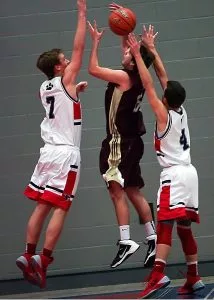
As March comes to a close, the NCAA Men’s and Women’s Basketball tournament is in full swing. Brackets are about to be busted, and Cinderella stories are about to be written. College basketball is one of America’s most popular sports, and basketball is the country’s most popular youth sport, played by one million children —450,000 girls and 550,000 boys — each academic year.
With soaring popularity in youth basketball, injuries are on the rise. Basketball is not typically associated with concussions and other traumatic brain injuries, but surprisingly those injuries are more common in basketball than many other sports.
According to the Journal of Pediatrics, basketball accounted for more than 9 percent of concussions among athletes aged 8-19 who participated in youth sports, placing it in second place just behind football at 22%. Soccer ranked third, at 7.7 percent, followed by hockey and baseball, at just under 4 percent each.
It is important when determining what youth sports programs your child should participate in, that the program has a comprehensive concussion protocol in place. The protocol must be followed and implemented by trained professionals.
Here is what to look for when deciding if a particular youth sports program is right for your child:
Make sure your child’s team has a written concussion protocol that is given to parents upfront. As part of that protocol, many programs require all athletes to take concussion baseline testing at the beginning of a season. This can help determine if an athlete has been impaired after suffering a head injury later in the season.
Coaches, volunteers, and teachers should be trained to make sure that, if a concussion is suspected or an athlete is showing signs and symptoms of a brain injury, he or she is kept out of the game or practice. When in doubt, sit them out.
Coaches should work with a licensed trainer to assess the injury during the game or in practice. If no licensed trainer is available, coaches should document the signs and symptoms so a health care professional can rely on them later.
There are a lot of methods to determine whether an athlete has suffered a brain injury. These tests can be as simple as observing the athlete and asking them questions, to more complex testing performed by health care professionals. Ask what program the coach uses to assess brain injuries.
Coaches, trainers, or other volunteers should immediately contact the parents or guardians so that the athlete can be seen by a health care professional who has experience with head injuries as soon as possible.
There should be no rush to return to practice or a game. Make sure that coaches are trained and focused on putting an athlete’s health ahead of winning games. The athlete should only return to practice or a game after passing concussion protocol testing and being cleared by a doctor or other health care professional for return to play.

"*" indicates required fields